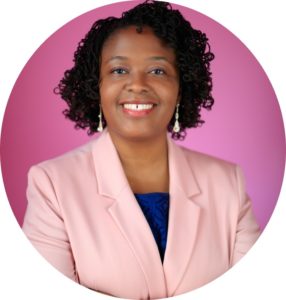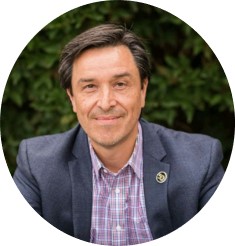When IFF was founded in 1988, our purpose was simple: to put flexible capital in the hands of nonprofits for facilities projects so that they’d have the quality spaces they needed to achieve their missions and strengthen their communities. What became apparent after several years, though, was that access to capital didn’t mean every nonprofit was ready to use that capital to grow their services and achieve greater impact.
Thus, IFF’s work expanded over time to include a broad continuum of activities like real estate consulting and capacity-building programming, which are focused on providing nonprofits with the support they need to strengthen their communities. To this day, some nonprofits require only a loan. Others simply need help navigating real estate and construction decisions. In many cases, however, some combination of services along IFF’s continuum is the key to unlocking the organization’s ability to advance its vision for stronger communities.
At IFF’s 2022 Investors Meeting, held virtually on May 24, three nonprofit leaders from the Midwest graciously joined us for a panel discussion – moderated by IFF Managing Director of Resource Development Nakea West – that explored how IFF’s continuum has enabled their organizations to meet the moment in their communities by serving more, serving more effectively, and serving more equitably.
The conversation was filled with powerful examples of what’s possible in communities when nonprofits have the support and resources they need to do their best work – and we think that’s worth sharing. Below, we’ve recapped highlights from the conversation, along with excerpts from the panelists’ remarks.
“No Margin, No Mission”
 Linda Little, president and CEO of Neighborhood Service Organization (NSO), a Detroit-based nonprofit that provides holistic care and safety net services that address social determinants impacting health, education, and economic stability. A member of the Detroit cohort of the JPMorgan Chase-funded Stronger Nonprofits Initiative (SNI) in 2019, Little and NSO are currently undertaking the development of a Healthy Housing Campus that includes the Detroit Healthy Housing Center (DHHC), which IFF provided a $6 million loan for last fall.
Linda Little, president and CEO of Neighborhood Service Organization (NSO), a Detroit-based nonprofit that provides holistic care and safety net services that address social determinants impacting health, education, and economic stability. A member of the Detroit cohort of the JPMorgan Chase-funded Stronger Nonprofits Initiative (SNI) in 2019, Little and NSO are currently undertaking the development of a Healthy Housing Campus that includes the Detroit Healthy Housing Center (DHHC), which IFF provided a $6 million loan for last fall.
Shortly after Little became the president and CEO of NSO, she joined the Detroit cohort of the Stronger Nonprofits Initiative. Though Little brought extensive experience in the health care industry to her new role, participating in the cohort provided a deep dive on nonprofit financial management that helped NSO significantly strengthen its outlook.
I spent almost 30 years as a health care executive before taking over as president and CEO of Neighborhood Service Organization, and I had an MBA, but what SNI helped me do was translate that to the nonprofit world.
“I came to know IFF through the Stronger Nonprofits Initiative,” Little explained. “I spent almost 30 years as a health care executive before taking over as president and CEO of Neighborhood Service Organization, and I had an MBA, but what SNI helped me do was translate that to the nonprofit world. I also had a new executive team, and three of them participated with me, which ensured we were all on the same page as a leadership team. We had a process, where, after every session, we fanned whatever information we learned out to the rest of the leadership team so that we all had some foundational context for how we would operate as a business. Because even though we are here to serve the community, you have to run it as a business – because no margin, no mission.
When I took over the organization, there were some financial challenges that I had to overcome very quickly. We had about 29 days cash on hand. And within the first year, we were able to turn a $3.5 million deficit into a $1.5 million surplus. The next year, we had a $2.5 million surplus, followed by a $3.5 million surplus the year after that. To shift 300 staff members on a dime to rally around this issue to be able create an environment and a culture that focuses on operational efficiency and revenue optimization is very difficult, and I attribute our ability to do that to the training through SNI. We now have about 200 days of cash on hand, we’ve built up reserves, and we have a renovation project going on with one of our facilities that’s incorporating new clinic space, new staff areas, and new work areas to deliver programs and services.”
With a Committed, Flexible Partner, the Ability to Try Something New
 Kimberly Townsend, founder and executive director of The Leadership School, St. Louis County’s first public charter school. Opening this fall, the K-2 school will offer individual learning plans for each student, designed to put children in the driver’s seat of their own educational journey. Over time, the school will expand to serve K-8 students, with enrollment expected to reach 450 children by 2028. IFF’s real estate team provided site search and predevelopment support for the school’s inaugural facility, being created by renovating two former warehouses in a federal Promise Zone, while also providing a $1.5 million loan to 22Beacon (formerly Charter Schools Development Corporation) for the renovation of The Leadership School’s facility, which it will lease from 22Beacon.
Kimberly Townsend, founder and executive director of The Leadership School, St. Louis County’s first public charter school. Opening this fall, the K-2 school will offer individual learning plans for each student, designed to put children in the driver’s seat of their own educational journey. Over time, the school will expand to serve K-8 students, with enrollment expected to reach 450 children by 2028. IFF’s real estate team provided site search and predevelopment support for the school’s inaugural facility, being created by renovating two former warehouses in a federal Promise Zone, while also providing a $1.5 million loan to 22Beacon (formerly Charter Schools Development Corporation) for the renovation of The Leadership School’s facility, which it will lease from 22Beacon.
When Kimberly Townsend was first connected to IFF in 2019, The Leadership School was nothing more than an idea in her head formed by the desire to approach education in a new way in St. Louis County. With no charter schools in the State of Missouri outside of the cities of St. Louis and Kansas City, Townsend was treading new ground and in search of partners to support her vision for quality education in the area.
One of the things that was beautiful about the partnership with IFF from the very beginning was a willingness to see the same need that I saw and to believe that we should do something about it.
“I had been in education for 15 years and had a lot of experience, but I had never launched a school,” said Townsend. “One of the things that was beautiful about the partnership with IFF from the very beginning was a willingness to see the same need that I saw and to believe that we should do something about it. IFF came alongside and walked the journey with me and, at that point, it wasn’t even about capital and a financial relationship. It was about the mission of IFF, the mission of The Leadership School, and the mission of The Opportunity Trust – which was also supporting my work – coming together to figure out how to plan and build this school together.”
For Townsend, bringing her vision for The Leadership School to life first required support finding a suitable location – a process that IFF’s real estate team in Missouri led – followed by predevelopment support to prepare for the renovation of the former warehouses selected as the future home of the school. Once that was completed, a loan from IFF provided the capital necessary to bring the school to fruition.
“From the real estate expertise in helping to look at buildings and deciding what would work for us, and then ultimately to the actual funding of our facility project, The Leadership School literally would not be able to open our doors without the support of IFF,” said Townsend. “Beyond that, there were a lot of ways in which our partnership with IFF and several other partners who came to the table have provided credibility as we’ve moved the project forward. It has signaled that we have support from partners who are respected and who believe in this idea and are vouching for it, and that has really been invaluable.”
Even for Well-Established Nonprofits, Access to Capital Isn’t Enough
 Adam Alonso, CEO of BUILD, a youth services nonprofit that helps young people on the West Side of Chicago overcome systemic obstacles to thriving futures through mentoring and other programming. A member of the first SNI cohort in Chicago in 2017, Alonso is now leading BUILD’s development of a new headquarters campus that will include 51,000 square feet of space across two facilities that will greatly enhance the organization’s capacity to serve its community – made possible in part by an IFF feasibility study, a $5.65 million bridge loan, and a $6 million New Markets Tax Credit allocation.
Adam Alonso, CEO of BUILD, a youth services nonprofit that helps young people on the West Side of Chicago overcome systemic obstacles to thriving futures through mentoring and other programming. A member of the first SNI cohort in Chicago in 2017, Alonso is now leading BUILD’s development of a new headquarters campus that will include 51,000 square feet of space across two facilities that will greatly enhance the organization’s capacity to serve its community – made possible in part by an IFF feasibility study, a $5.65 million bridge loan, and a $6 million New Markets Tax Credit allocation.
For BUILD, which was founded in 1969 and has a well-established track record of success in carrying out its mission, credibility in the community wasn’t a barrier to moving forward with its plans for growth. Instead, the organization needed technical assistance to build its financial capacity, guidance to navigate real estate decisions, and a partner willing to buy into its vision for community development on Chicago’s West Side. Over the course of five years, the organization’s partnership with IFF provided just that as BUILD engaged with us at several points along the continuum.
Despite a $5 million commitment from the state, the lenders we talked to were only willing to loan us $1 million in bridge financing. IFF was willing to make the loan, though, and to stand with us in that moment as we took a leap of faith on a major investment in our community and in our young people.
“BUILD’s story is an IFF story,” said Alonso. “We were invited to be part of the first cohort in 2017 of the Stronger Nonprofits Initiative, and at that time we were experiencing growth. We had started to outgrow our space, which was a 10,000-square-foot former bank. One of the benefits of being part of SNI was being able to do a feasibility study, which we did. Getting that deep of a look at price tags based on square footage, I knew I was in way over my head. And I’m grateful to IFF for helping calm me down a bit and walk me through, like, ‘Yes, it’s scary, but there’s always a path.’ Someone from IFF came and did a presentation for our board, and they were impressed. A little less than a year later, we had made the decision to move forward with plans for a new, 51,000-square-foot youth and community center on our property.”
By the summer of 2020, BUILD had completed the predevelopment work necessary for its new facility and was planning to raise the rest of the money necessary to complete the project before proceeding with construction. But violence in the community affecting young people that summer influenced the timeline for its facility project – with the organization making the decision to move forward with construction months ahead of schedule to complete the project and expand its capacity as quickly as possible.
Though BUILD had already secured several major pledges for the project and a $5 million commitment from the State of Illinois through a capital plan allocation, the organization needed bridge financing to cover construction costs until actually receiving the donations and funding.
“Despite a $5 million commitment from the state, the lenders we talked to were only willing to loan us $1 million in bridge financing,” said Alonso. “IFF was willing to make the loan, though, and to stand with us in that moment as we took a leap of faith on a major investment in our community and in our young people. That lent credibility to the project and caused others to see it as investment worth making on the West Side.”
Learn more about IFF’s continuum and why community development projects require far more than capital alone, and visit our news page for stories about how the continuum has enabled other Midwest nonprofits to strengthen their communities.
Tags: : Capital Solutions, Health Care, Real Estate Solutions, Schools, Youth Services